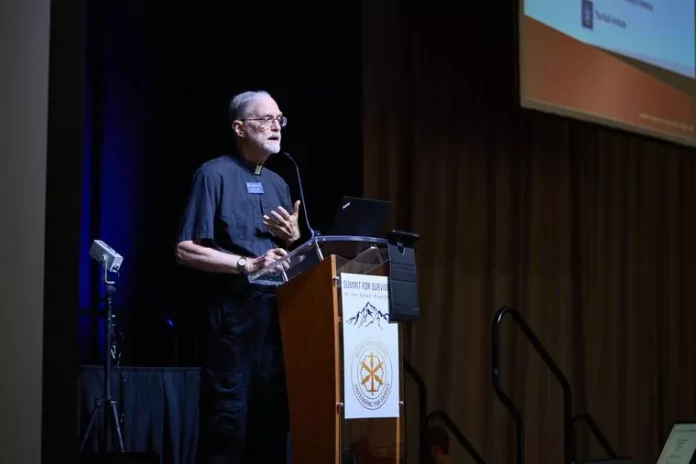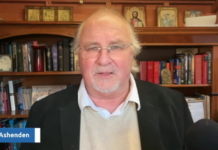Over the past two decades, as Americans who identify as “gay” and “lesbian” secured social acceptance, expanded legal protections and marriage rights, an acrimonious parallel debate has sprung up over claims that so-called “conversion therapy” for people dealing with unwanted same-sex attraction is unethical, harmful and should be prohibited.
The American Psychological Association (APA) and leading medical organizations have condemned “conversion therapy” or “reparative therapy” — described in academic literature as “sexual orientation change efforts” or SOCE — citing research linking the practice to higher rates of suicidality for people who undergo treatment to remove or mitigate homosexual feelings. These studies have bolstered attacks on the practice by “LGBT” activists who say such efforts are coercive and motivated by “hate.” Last year, President Biden issued an executive order directing federal agencies to prevent federally funded programs from offering conversion therapy.
Father Paul Sullins, a professor of sociological research at The Catholic University of America, has studied the most recent, widely cited research supporting the claims against conversion therapy. In a 2022 paper, “Sexual Orientation Change Efforts Do Not Increase Suicide: Correcting a False Research Narrative,” he challenged the methodology employed in the influential studies that prompted calls for a global ban on SOCE, and his findings have prompted pushback, as well as debate.
During an interview with Register senior editor Joan Frawley Desmond, Father Sullins explained why the studies’ methodology was flawed. He also discussed the “monoculture” within the academy that has allowed poorly executed peer-reviewed studies to go largely unchallenged.
Likewise, he pointed to signs of hope that encourage researchers like him to continue to provide strong, evidence-based research evaluating these treatments and sharing information on what they can and cannot do for people looking for help.
How did you take up this issue?
I was invited by Dr. Christopher Rosik to cosign an editorial letter on the flaws of a 2020 study by Blosnich et al., which claimed that they had population data showing that persons who had been through SOCE therapy had about twice the rate of suicidal ideation and 1.7 times the rate of suicidal attempts as sexual minorities who had not been through SOCE. The findings led to the conclusion that the experience of SOCE “may compound or create” these problems.
The Williams Center, the Los Angeles, California-based research institute that the authors are involved with,
called for the banning of SOCE therapy around the world, and it posted the Blosnich study as justification for this guidance.
In late 2020, the United Kingdom Equalities Office prominently cited the Blosnich study as support for a ban on SOCE in Great Britain.
In February 2021, the American Psychological Association (APA), which had previously advised caution in the administration of SOCE, published a revised resolution calling for it to be banned because of “emerging research,” which included four population studies that all concluded that SOCE exacerbated suicidal ideation. The strongest study was the one by Blosnich et al.
Why did this study’s findings grab your attention?
They were not consistent with my own experience of persons who struggled with or had recovered from unwanted same-sex attraction. And the year before, Dr. Rosik and I had published a clinical study of 125 men who had undergone SOCE, who reported strongly positive psychological effects from the therapy. Just over 2% reported that after SOCE they had been more suicidal, but 22% reported that they were “extremely” less suicidal after SOCE — that’s a 9-to-1 ratio of positive results.
So you reanalyzed the methodology and data collected by the four studies cited by the Williams Institute. What were your findings?
I discovered that all four studies compared lifetime expressions of suicidality in people who had undergone SOCE with those who had not. But they didn’t distinguish between the suicidality that people expressed before they began SOCE and the suicidality they expressed after treatment. That measure, which is called “controlling for prior distress,” is necessary for any study seeking to show that interventions cause harm. It was available for the Blosnich study, but they didn’t use it.
For example, if someone wanted to show that abortions cause depression in women who have undergone the procedure, then they must first control for whether they were depressed before they underwent the abortion. It is the same argument here.
My finding was that people’s level of suicidality after they went to SOCE was the same or lower than people of comparable age who had not been to SOCE. What made the SOCE group look more suicidal in the Blosnich study was that they expressed more suicidality — thoughts of suicide and suicide attempts — before they went to SOCE.
Blosnich and company blamed the disease on what is, at least in part, a cure, and then called for the cure to be banned or restricted. This is backwards logic. Imagine a study that calls for banning anti-hypertension medications because it found that most persons using the medication have also previously had high blood pressure. Such a study would be using the same perverse logic as the Blosnich study and similar studies.
Is there a formal definition of conversion therapy that “LGBT” activists use when they call for banning the practice?
The persons who actually take part in SOCE generally reject the term “conversion therapy.” That’s because the primary goal of the therapy is usually not to change their same-sex attraction, but to live in accord with their religious convictions, or they are in a heterosexual marriage and they want to live a happy integrated life, whether the same-sex attraction changes or not. Most SOCE participants report increasing their heterosexual attractions but not completely displacing their same-sex attractions.
In the study I conducted with Dr. Rosik, 55% had some change, but only 14% completely changed from homosexual to heterosexual. That said, almost all of them reported positive results in managing their convictions and commitments.
You point to a disconnect between researchers, who seek to prevent what they see as hateful and harmful form of therapy, and mostly adult patients who have good reasons for undergoing this therapy. Did you study the impact of SOCE on young people pressured by their families to undergo therapy?
I found that persons undergoing SOCE as minors — before age 18 — experienced no overall reduction in suicidality. Minors undergoing SOCE in a religious setting reported worse outcomes than those who went to nonreligious therapy.
One less critical form of suicidal expression — declaring an intent to commit suicide — was significantly higher after undergoing SOCE as a minor. This may account for the widely publicized accounts of sexual minority persons who declare that SOCE made them suicidal. If you notice, they are almost always talking about being forced to undergo SOCE as a child. Such accounts are misleading regarding the net benefit of SOCE — there are just as many suicidal sexual minority persons who have not undergone SOCE as a minor — but we should pay attention to and learn from the distress of these people.
In my opinion, parents should never force a resistant child with same-sex attraction to undergo counseling, religious or otherwise. It can too easily do more harm than good. If they wait a few years until the child may seek help on his or her own as a young adult, the prospects for success are much better.
Disordered love cannot be restored by fear, but only by a greater, better-ordered love. Since homosexual attraction is often associated with stresses in perceived parental affection, parents of a child with same-sex attraction would do better to learn how to love and welcome their child in ways that may help everyone relax and grow in their love for each other in positive ways. I recommend [Joseph] Nicolosi’s book A Parent’s Guide to Preventing Homosexuality (order at Books-A-Million), or Bryan Shen’s The Unaffirmed Core (order at Amazon).
Some experts also point to another problem: SOCE researchers who recruit people through “LGBT” networks are less likely to tap individuals in religious communities, creating a less diverse pool of respondents and skewing the results.
This bias corrupts almost all research in this area. The problem is that if the SOCE therapy is successful, the person will come out identifying as straight, not gay, and many same-sex-attracted persons also do not identify as “gay” because they do not want to be defined by their sexuality. So to look at only currently “LGBT”-identified persons is to select only less religious persons for whom SOCE failed.
As one researcher put it, this approach is like assessing the effect of marriage therapy by only surveying people who subsequently divorced.
Researchers who back your work contend that the uncritical acceptance and promotion of these flawed studies shows that the experts reviewing these studies are part of “monoculture” influenced by political and cultural bias.
When I submit a study that does not explicitly advocate gay-activist goals, it is labeled “heteronormative” by most U.S. journals and rejected before being sent to peer review. The same is true for a study on abortion that might show harm for women or support the idea that the natural family is better for children than single or divorced parents.
The American Psychological Association, which manages most of the psychological journals in the U.S., has a committee staffed by “LGBT” activists that actively censors what they see as “heterosexist” bias.
But it’s a big world: My study was published by a high-quality Canadian journal, and in Europe you find a range of journals willing to publish different views.
How has Bosnich responded to your critique?
Blosnich has actually tried to defend the idea that lifetime associations can be causal, rejecting the principle that a temporal cause cannot come after an effect in time. I have rejoined that this is like saying that lung cancer causes smoking. In the entire history of science since Aristotle, who first stated the principles of efficient causation, no one has ever denied that a cause must precede an effect. Not even the skeptic David Hume, who thought causation was entirely psychological.
Today’s gay-activist scholars have to affirm (what I call) the fallacy of association, though, because it is the basis for their entire theory that the higher rates of psychological problems among homosexual persons are due to societal stress and not childhood trauma or developmental factors. If we demand that a cause must precede an effect, then the higher rate of suicide attempts among sexual minorities (over four times that of heterosexual persons) is more likely related to the higher rate of childhood sexual abuse they experience (also over four times that of heterosexual persons) than to persistent social discrimination.
Read it all at the Catholic National Register



